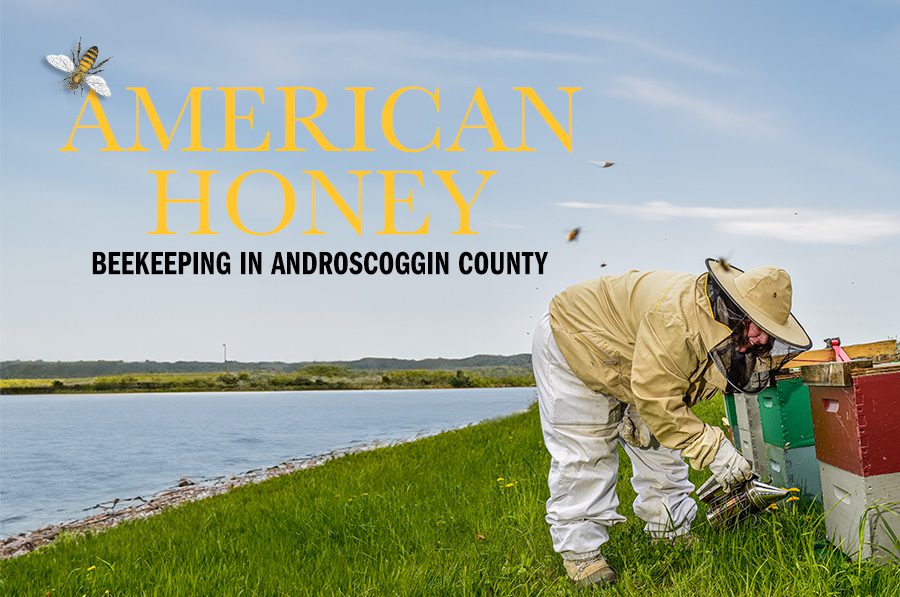by Jillian Netherland | photography by Jose Leiva
Summer has arrived in Maine, bringing with it the warmth, excitement, and longer days of the welcomed season. For Androscoggin County beekeepers, though, it’s always beekeeping season, and this mutually beneficial relationship is one to be celebrated.
“It’s year-round maintenance, but the majority of our time is consumed from April through October when we are constantly observing the bees to make sure they’re healthy, safe, and happy,” explains Beverly Stevens, beekeeper at Old Glory Bees and Honey.
Alongside her husband, Beverly began learning about beekeeping as a hobby three years ago. The hobby grew into a passion project that took off, leading the couple to become dedicated beekeepers full-time.
Taking care of Bees-ness
The tender loving care Stevens describes is the cornerstone of any beekeeper’s work. Bees do not naturally stay in one spot, so it’s the beekeeper’s job to ensure their hives are warm and have the appropriate volume of food and honey to stay in one spot for monitoring. This is especially critical in Maine, where winter climates can be harsh, and the spring is often unpredictable.
“One of the challenges for beekeepers is to minimize loss, work to replace those losses when they happen, and not become discouraged,” shares Paul Gillis, beekeeper at Shaker Village, who lost two of eight hives during the last season. Per Jennifer Lund, State Apiarist at the Maine Department of Agriculture, Conservation, and Forestry, 283 hives were registered to 60 beekeepers throughout Androscoggin County in 2022, and nearly 22% of these hives were lost.
“Bees don’t hibernate, but they won’t fly if the temperature is below 50 degrees, so they stay in the hive,” Gillis explains. During the winter months, beekeepers make sure the hives have enough food storage and honey to make it through until spring, then wrap the hives with insulation. Once the weather warms, the beekeeper will unwrap the hives and continue providing food for the bees until enough plants have returned for the bees to fly and find pollen and nectar again on their own.
In addition to plummeting winter temperatures, beekeepers need to protect their hives from the ongoing battle of destructor mites that attach and feast on bees, and ensuring they have the correct amount of food, noting that even an overabundance of food will lead to starvation.
“Bees are smart – to their own detriment at times,” tells Stevens. “We lost a hive in late February, and it didn’t make any sense. It had made it through the winter with plenty of food and bees, then died, seemingly out of the blue. We brought in an expert to assist and learned that because the hive was so full of everything, the bees believed they wouldn’t be able to sustain it and collectively starved themselves.”
Despite the winter weather, mites, and balance of food that can all contribute to hive loss, Maine is in fact primed for beekeeping, because of its high volume of natural flowers and produce gardens.
The more bees work in an area, the more plant life will appear from pollination, including wildflowers and clover, to name a few.
Returning the favor
“Bees are critical for the food chain to exist as we know it,” Gillis states. “All garden produce, pumpkins, and apples are pollinated by bees, as well as many agricultural plants and flower gardens.”
Bees giving back to those who care for them doesn’t end with the food we consume and plants we enjoy – many would argue that bees are also good for emotional wellness. Hives for Heroes, a national nonprofit organization, pairs veterans who are disabled or struggling with mental health issues with a fellow veteran mentor to learn beekeeping as a way to relax, focus, or find the motivation to overcome obstacles.
Once the veteran has gone through the mentoring process and has been a beekeeper for a few years, they then become mentors to teach other veterans the art of beekeeping.
“Bees have their own energy in the hive – you can see it, you can feel it, and you can hear it,” says Stevens, whose husband is a veteran and began his beekeeping journey as a way to keep his mind occupied by focusing on something positive. “Some therapies use sound waves recorded from beehives for meditation – it’s something that is very healing.”
Working together
Living and working as a community for their survival, each member of the hive has its own role. Worker bees and nurse bees take care of the young bees, while other bees specialize in building honeycombs or gathering pollen and nectar, and the queen bee, whose lifetime job is to lay eggs.
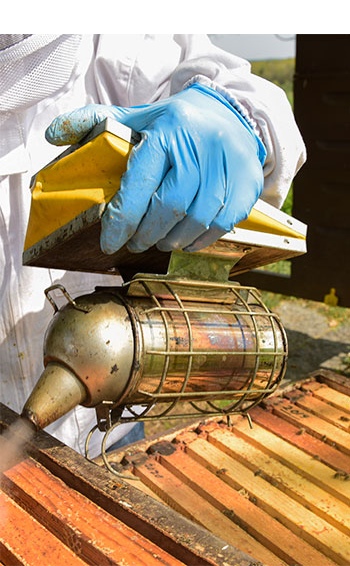

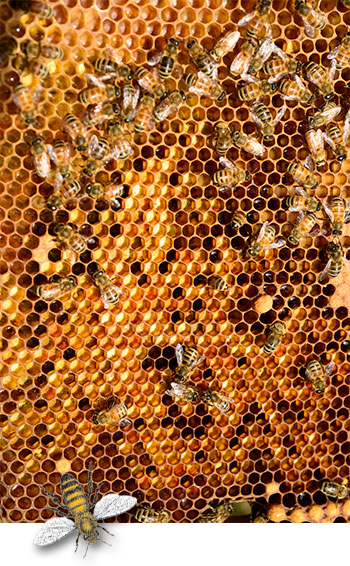

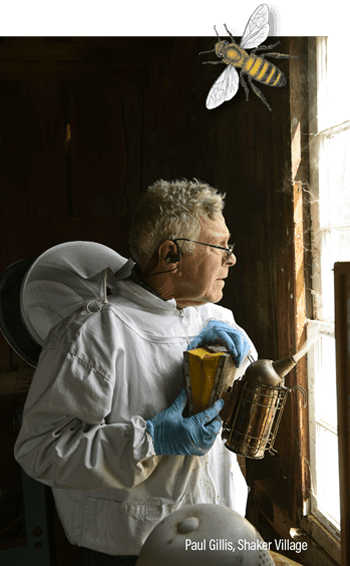

“Bees reproduce by swarming, and strong hives with a high census will try to swarm and create a second hive,” explains Gillis. When this happens, half of the bees from the hive leave, which could result in a hive of all worker bees that may or may not produce honey. Additionally, only 50% of hives that swarm will survive to the following year.
“When we see the hives getting crowded and recognizing their strength, we create an artificial swarm for them,” Gillis shares. “We take some of the mature bees and babies and move them to a second hive that we can keep healthy.”
This approach to repopulation is also utilized during the unfortunate event of hive loss. When this occurs, the beekeeper will take a number of bees, larvae, and eggs from a strong hive to replenish those that have been lost, effectively creating new hives.
Local honey
Perhaps the most renowned benefit of beekeeping is the honey it produces. Honeybees begin harvesting, storing, and making honey as early as April, then spend the summer months building and growing as much as they can, producing the greatest volumes of honey in July and early fall when the humidity in the air primes flowers for nectar production.
Once the bees have capped their honeycombs with a layer of wax, it signifies to the beekeepers that the honey is ready for collection. Each hive is comprised of stacks of boxes made up of 10 frames each containing honey cells. When everything is capped, the beekeeper will use a smoker device to push the bees down and remove the box.
“We work with the bees to know which days are better than others for honey extraction,” Stevens explains. “As long as we’re gentle and patient, the bees make it easy for us.”
When the boxes are removed, they are taken to a new location, with extra care to hide the boxes from the bees. Instinct-driven creatures, bees will find the honey boxes and steal them back if left unprotected. Once delivered safely to their new location, the double-sided box frames are then opened with a hot knife, and the wax cappings are removed and saved to be melted down and rolled on a plastic frame – providing a base for future honey cells in the hives and beeswax candles to be sold.
When all sides have been uncapped, the frame is slid into a metal rack inside a metal bin and spun to pull all the honey from the frame. As it is withdrawn, the honey is drained into a pail with strainers to catch any extra pollen or wax, leaving a clear, pure, raw product ready to be bottled and jarred.
“We do leave some honey in the hive,” Stevens notes. “We typically have two harvests per year and leave enough honey for the bees to make it through winter.”
Sharing the love
Private beekeeping as a hobby gained popularity during the COVID-19 pandemic. Maine beekeepers have seen an increase in interest from young adults and even children wanting to learn more about bees and how to care for them. Through a partnership with the Oxford County Cooperative Extension Office, Old Glory Bees and Honey provided their property as a field trip destination for homeschool students. What was initially scheduled as an hour-and-a-half long discussion and demonstration became a three-hour deep dive into all things bees, as the students embraced the information and excitedly asked more questions.
“About halfway through our time together, one little girl said that a bee had landed on her,” Stevens recalls. “We talked about it as I removed the bee with a safety tool and showed the bee to the rest of the students. These are the types of experiences I want people to have, so they can walk away less afraid and more understanding of bees and how they affect the world around them.”
Additional bee educational events between Old Glory Bees and Honey and Oxford County Cooperative Extension are planned for the summer of 2023. These interactive demonstrations will teach participants how hives work, what an apiary does, and where bees can forage for pollen.
A true win-win
As beekeeping continues to grow in popularity, Maine beekeepers encourage those interested in setting up hives on their own property.
It’s not a particularly difficult hobby or process, and many people are finding they can easily add a hive to their backyard,” shares Gillis. “I always think of beekeeping as a true win-win situation. They get a good home where they are cared for, treated for mites that they otherwise wouldn’t be able to handle on their own, pollinate flowers, and make more honey than they need to use – so the beekeeper gets the honey, and the community gets the flowers and their gardens populated.”
For others, the appeal of beekeeping is finding peace in a fast-paced world.
“The more I’m around it, the more it connects me to nature,” Stevens affirms, sharing that beekeeping has shifted her focus. Being in tune with the weather and plants around her helps her ensure the bees have what they need. “It’s a marvel to watch them and see how happy they are to be flying. I love hearing them – I can tell whether they’re happy, sad, or just doing their thing. It’s just a happy, mellow sound.”
Despite increased interest in apiculture, you don’t have to become a beekeeper to help bees. Planting a garden, minimizing use of pesticides, allowing dandelions to bloom, and working with local governments to make public spaces more bee-friendly are all simple ways to support bees throughout Maine.
And of course, as Gillis states, “purchasing local honey and other bee products from your local beekeeper is always welcome.”
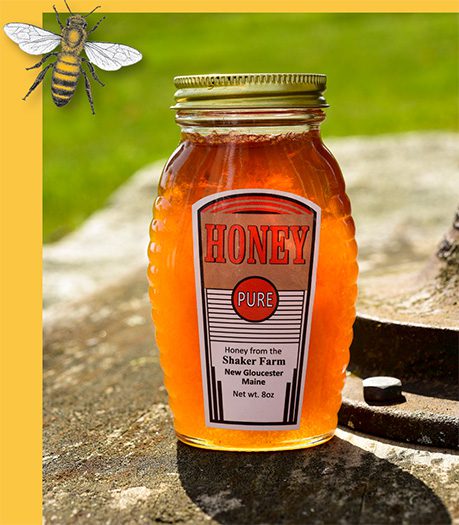

Shaker Village – New Gloucester
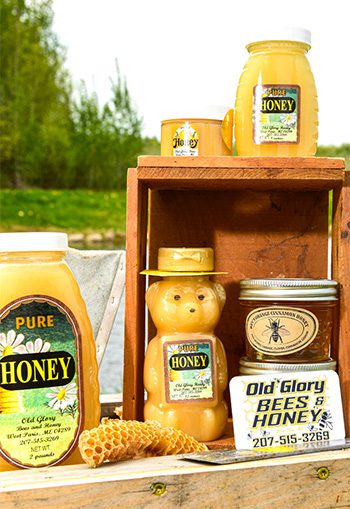

Old Glory Bees and Honey – West Paris
A Pennsylvania native, Jillian moved to Maine from Dallas, Texas, with her husband and two toddler daughters in August of 2020.
Her lifelong love of the written word began with writing short stories and poems at the age of six, eventually leading to the creation of her own company, EleGrant Writing Services. Jillian is a business development specialist for Androscoggin Home Healthcare + Hospice by day and enjoys live music, books, and creative writing.


